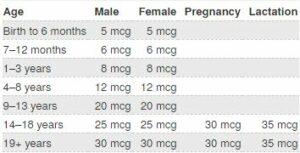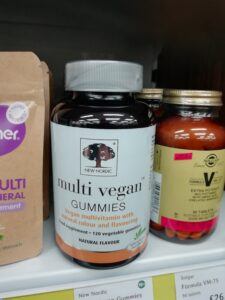Interested in having healthy hair, skin and nails?
Then you may have been wondering about Biotin.
Biotin has really taken off as a popular supplement and recommendation from beauty gurus everywhere in recent years. But is it vegan-friendly? Is it for you? We’ve got the low-down for you here.
What exactly is biotin? What does it do in the body?
Biotin is also known as Vitamin H, B-7 or Coenzyme R.
This water-soluble vitamin is important for many functions in the human body, as it helps cells to use energy, and assists in the metabolism of fats, proteins and carbohydrates consumed through food.
Biotin is necessary for good skin health and is commonly known for its role in maintaining healthy hair, due to its function in the production of Keratin – the protein from which hair and nails are made.
Therefore, if you’re looking to have healthy, glowing skin and hair, it’s important to ensure that you are consuming enough biotin.
Adequate amounts of biotin are crucial in pregnancy for the developing baby. A lack can result in birth defects.
How can you tell if you are deficient in biotin?
You should note that as biotin deficiency is rare, the US Food and Drug Administration (FDA) doesn’t currently offer an official recommendation for the daily amount, but nutritionists suggest the following;
From birth to 3 years: 10 to 20 micrograms (mcg)
ages 4 to 6 years: 25 mcg
ages 7 to 10 years: 30 mcg
Whereas the Food and Nutrition Board at the National Academies of Sciences, Engineering & Medicine suggest;

As we continually reiterate here, – many deficiencies can show similar symptoms, so it’s always wise not to self-diagnose. Within a varied diet, biotin deficiency is relatively rare, as there are many abundant sources. However, some of the common symptoms of a biotin deficiency are hair loss, (this can include the eyebrows as well as the hair on your head), rashes on the skin and brittle nails. In some cases, scaly skin can appear around the orifices of the body, such as around the eyes, nose and mouth, and even the nether regions. In more extreme cases, symptoms may also be fatigue, insomnia, loss of appetite, depression, muscle pain, cracking at the corners of the mouth, and nausea.
Symptoms usually appear gradually, and typically begin with thinning hair.
If you know your diet is lacking in some way, then it is a good idea to look at what you are consuming and what you might be missing, look at the symptoms associated with lack of certain micronutrients and where possible, discuss with a health care provider / G.P.
A blood test will reveal the level of B-7 or Biotin in your blood. Occasionally, low levels of biotin can be caused by underlying conditions, which is why it’s always best to get checked out by a health professional.
POINT TO NOTE: Biotin has been found to falsely skew lab results both positively and negatively for thyroid tests. A lot of health professionals are still unaware of this. Therefore if you do take biotin supplements and you have any bloodwork done to test TSH, T3 or T4 levels for your thyroid health, please ensure you mention to them that you are taking biotin supplements.
Causes of biotin deficiency
One of the most obvious causes would be a lack of biotin in the diet.
Other causes, such as malabsorption as a result of certain medications, (such as certain antibiotics and medications used for the control of seizures), the use of intravenous feeding in a hospitalised patient, problems in the gut, and even genetics, are also possible.
What natural sources of biotin are there?
Vegan sources of biotin can be found naturally in legumes and lentils, peas, whole grains such as corn and barley, sunflower seeds, carrots, mushrooms and cauliflower.
As with many water-soluble vitamins, Biotin is destroyed when food is processed, so it’s important to consume these foods whole and unprocessed in order to get the benefit.
Can you overdose on biotin and are there negative side effects if you do?
Biotin is one of the water-soluble vitamins. This means that it is not stored in the body and must be consumed daily. Biotin dissolves in water and is passed out of the body via urine. It is therefore not a problem to consume more than the daily recommended amount of biotin, as any more than the body requires in a given day is simply flushed out.
To date, there are no contraindications reported from taking ‘too much’ biotin, and no risk of toxicity as there is with some supplements. Be aware of its ability to affect test results for other conditions, however, as mentioned above.
Do biotin supplements work?
Personally, I went through a period of not eating well due to personal circumstances, and after a while, I noticed that my hairline had receded, and my eyebrows were stopping short, – i.e. not growing properly towards the end of my eyes, as though they had been overplucked. (This was not a good look!) I also started to develop small, very slightly scaly patches in the outer corners of my eyes. After doing some research, and addressing other areas of deficiency, such as iron and vitamin D that had developed in those months, I started to take a biotin supplement. After around 3-4 weeks of taking it, I noticed fine baby hairs in my hairline, where the hair was finally starting to grow back! My hairdresser commented that she could now see that the hair was growing back all across my scalp. My eyebrows eventually returned to a normal length and the redness disappeared from the outer corners of my eyes. After around 4 months of taking the supplement, the baby hair was several inches long and growing nicely. I would be inclined to put this down to the complete overhaul I did in terms of nutrition, as due to the circumstances I had become deficient in many different vitamins and minerals, but I know that finally consuming biotin again played a big role in this recovery and I’ll never be without it again.
Where can I buy supplements?
Biotin in supplement form is available as pure biotin, as a component of some B-Vitamin supplements and sometimes within a multivitamin. You can easily purchase supplements at stockists such as Holland & Barrett in the UK, some major supermarkets also carry them, and of course you can buy them worldwide online at Amazon and online vegan stores.
Vegan gummies are very common and easily available now from most major stockists.
Which vegan biotin supplements are the best?
There are now many brands available for you to try. In the UK, Holland & Barret stock the HairBurst, their own brand, Solgar, Deva, and many more all offer vegan biotin supplements.
It’s worth noting that many supplements actually contain a variety of different vitamins or minerals to either assist in hair growth or the improvement of the skin. For example, as per the HairBurst brand, they may also contain zinc, selenium, vitamins A, B6, B12, C and E. If this is the case, be sure that you are not ‘overdosing’ on any of the fat-soluble ones by consuming too much of them in other foods or supplements. On the plus side, this may mean taking fewer supplements overall, because you’re getting more of them combined in one supplement. (I stopped taking a B12 supplement for example, because the dosage in the Hairburst is sufficient, and I also consume a lot of soymilk, which is also fortified with this vitamin).
The only one I’ve tried so far is the HairBurst Unicorn Vegan Hair Vitamins. Yes, they are kind of pricey, (@ £25 in the UK), but they taste delicious and they definitely worked for me!
However, I strongly recommend that you write your own recommendations in the comments below. Tell us which brands you’ve tried and what your experiences have been.
References:
https://endocrinenews.endocrine.org/january-2016-thyroid-month-beware-of-biotin/
https://ods.od.nih.gov/factsheets/Biotin-HealthProfessional/



